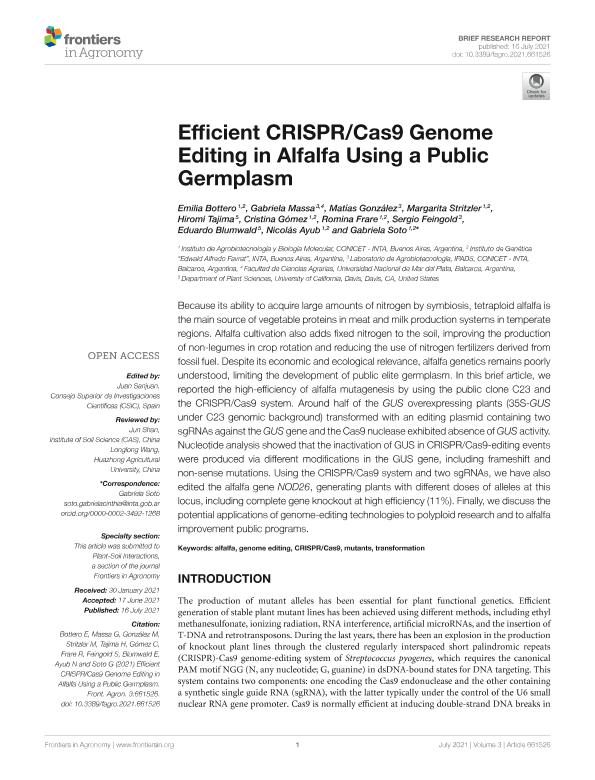Artículo
Efficient CRISPR/Cas9 Genome Editing in Alfalfa Using a Public Germplasm
Bottero, Ana Emilia ; Massa, Gabriela Alejandra
; Massa, Gabriela Alejandra ; Gonzalez, Matías Nicolás
; Gonzalez, Matías Nicolás ; Stritzler, Margarita
; Stritzler, Margarita ; Tajima, Hiromi; Gómez, Cristina; Frare, Romina Alejandra
; Tajima, Hiromi; Gómez, Cristina; Frare, Romina Alejandra ; Feingold, Sergio; Blumwald, Eduardo; Ayub, Nicolás Daniel
; Feingold, Sergio; Blumwald, Eduardo; Ayub, Nicolás Daniel ; Soto, Gabriela Cynthia
; Soto, Gabriela Cynthia
 ; Massa, Gabriela Alejandra
; Massa, Gabriela Alejandra ; Gonzalez, Matías Nicolás
; Gonzalez, Matías Nicolás ; Stritzler, Margarita
; Stritzler, Margarita ; Tajima, Hiromi; Gómez, Cristina; Frare, Romina Alejandra
; Tajima, Hiromi; Gómez, Cristina; Frare, Romina Alejandra ; Feingold, Sergio; Blumwald, Eduardo; Ayub, Nicolás Daniel
; Feingold, Sergio; Blumwald, Eduardo; Ayub, Nicolás Daniel ; Soto, Gabriela Cynthia
; Soto, Gabriela Cynthia
Fecha de publicación:
07/2021
Editorial:
Frontiers Media
Revista:
Frontiers in Agronomy
e-ISSN:
2673-3218
Idioma:
Inglés
Tipo de recurso:
Artículo publicado
Clasificación temática:
Resumen
Because its ability to acquire large amounts of nitrogen by symbiosis, tetraploid alfalfa is the main source of vegetable proteins in meat and milk production systems in temperate regions. Alfalfa cultivation also adds fixed nitrogen to the soil, improving the production of non-legumes in crop rotation and reducing the use of nitrogen fertilizers derived from fossil fuel. Despite its economic and ecological relevance, alfalfa genetics remains poorly understood, limiting the development of public elite germplasm. In this brief article, we reported the high-efficiency of alfalfa mutagenesis by using the public clone C23 and the CRISPR/Cas9 system. Around half of the GUS overexpressing plants (35S-GUS under C23 genomic background) transformed with an editing plasmid containing two sgRNAs against the GUS gene and the Cas9 nuclease exhibited absence of GUS activity. Nucleotide analysis showed that the inactivation of GUS in CRISPR/Cas9-editing events were produced via different modifications in the GUS gene, including frameshift and non-sense mutations. Using the CRISPR/Cas9 system and two sgRNAs, we have also edited the alfalfa gene NOD26, generating plants with different doses of alleles at this locus, including complete gene knockout at high efficiency (11%). Finally, we discuss the potential applications of genome-editing technologies to polyploid research and to alfalfa improvement public programs.
Palabras clave:
ALFALFA
,
CRISPR/CAS9
,
GENOME EDITING
,
MUTANTS
,
TRANSFORMATION
Archivos asociados
Licencia
Identificadores
Colecciones
Articulos (IABIMO)
Articulos de INSTITUTO DE AGROBIOTECNOLOGIA Y BIOLOGIA MOLECULAR
Articulos de INSTITUTO DE AGROBIOTECNOLOGIA Y BIOLOGIA MOLECULAR
Articulos (IPADS BALCARCE)
Articulos de INSTITUTO DE INNOVACIÓN PARA LA PRODUCCIÓN AGROPECUARIA Y EL DESARROLLO SOSTENIBLE
Articulos de INSTITUTO DE INNOVACIÓN PARA LA PRODUCCIÓN AGROPECUARIA Y EL DESARROLLO SOSTENIBLE
Citación
Bottero, Ana Emilia; Massa, Gabriela Alejandra; Gonzalez, Matías Nicolás; Stritzler, Margarita; Tajima, Hiromi; et al.; Efficient CRISPR/Cas9 Genome Editing in Alfalfa Using a Public Germplasm; Frontiers Media; Frontiers in Agronomy; 3; 7-2021; 1-8
Compartir
Altmétricas



